| Srl | Item |
| 1 |
ID:
093911
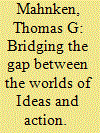

|
|
|
| 2 |
ID:
093916
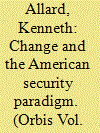

|
|
|
|
|
| Publication |
2010.
|
| Summary/Abstract |
What do Mexican civil instability and an increasingly well-armed narco-insurgency mean for homeland defense? What lessons about confronting U.S. military power might the drug networks have learned from those other malevolent networks, the same ones responsible for 9/11? And while we have always assumed a neat institutional distinction between the United States' internal defenses and the military power mobilized to protect its international interests, are porous borders and trans-national syndicates blurring those boundaries? These questions become more urgent with the growth of affluent, aggressive, and highly networked groups where the traditional distinctions between criminal and terrorist are often rendered meaningless.
|
|
|
|
|
|
|
|
|
|
|
|
|
|
|
|
| 3 |
ID:
093912


|
|
|
|
|
| Publication |
2010.
|
| Summary/Abstract |
We compare the rise of Chinese seapower today to the rise of Imperial German seapower a century ago. The comparison is worthwhile for two reasons. First, the comparison holds merits in its own right. We use German Admiral Wolfgang Wegener's three indices of seapower-strategic position, the fleet, and strategic will to the sea-to assess the two countries' maritime potential. This analysis leads inexorably to the conclusion that China holds far more potential for seapower that did the Kaiser's Germany. And second, the Chinese themselves are consulting German history as they inquire into the triumphs and failures of past great powers. Trying to divine how they interpret the German experience could let Western practitioners and scholars of grand strategy glimpse China's maritime future. In turn they can improve their own handling of strategy in East Asia.
|
|
|
|
|
|
|
|
|
|
|
|
|
|
|
|
| 4 |
ID:
093913
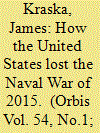

|
|
|
|
|
| Publication |
2010.
|
| Summary/Abstract |
Years of strategic missteps in oceans policy, naval strategy and a force structure in decline set the stage for U.S. defeat at sea in 2015. After decades of double-digit budget increases, the People's Liberation Army (Navy) was operating some of the most impressive systems in the world, including a medium-range ballistic missile that could hit a moving aircraft carrier and a super-quiet diesel electric submarine that was stealthier than U.S. nuclear submarines. Coupling this new asymmetric naval force to visionary maritime strategy and oceans policy, China ensured that all elements of national power promoted its goal of dominating the East China Sea. The United States, in contrast, had a declining naval force structured around 10 aircraft carriers spread thinly throughout the globe. With a maritime strategy focused on lower-order partnerships, and a national oceans policy that devalued strategic interests in freedom of navigation, the stage was set for defeat at sea. This article recounts how China destroyed the USS George Washington in the East China Sea in 2015. The political fallout from the disaster ended 75 years of U.S. dominance in the Pacific Ocean and cemented China's position as the Asian hegemon.
|
|
|
|
|
|
|
|
|
|
|
|
|
|
|
|
| 5 |
ID:
093919
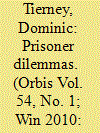

|
|
|
|
|
| Publication |
2010.
|
| Summary/Abstract |
For centuries, the issue of American hostages and POWs has had incredible emotional and political resonance. Driven by a combination of idealism, wrath, and concerns over reputation, the status of captive Americans can become a national obsession. While deeply moral in many respects, this intense focus can encourage risky rescue operations, deepen conflicts, and lead to more Americans being captured abroad. Jimmy Carter and Ronald Reagan both suffered grave political damage from hostage crises, and the recent capture of an American by Somali pirates highlights the continued danger that a hostage crisis could overshadow the presidency of Barack Obama. U.S. officials should publicly downplay the issue of hostages and POWs, and work quietly behind the scenes to free the men and women concerned.
|
|
|
|
|
|
|
|
|
|
|
|
|
|
|
|
| 6 |
ID:
093915
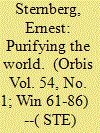

|
|
|
|
|
| Publication |
2010.
|
| Summary/Abstract |
The past decade has seen the coalescence of a new ideology that envisions social movements in a cataclysmic struggle against global capitalist Empire. Controlled by U.S. militarism and multinational corporations, in cahoots with Zionism, Empire contaminates environments and destroys cultures. Its defeat will bring about a new era of social justice and sustainable development, in which the diverse cultures harmoniously share the earth. Is this a totalitarian ideology? From fascist and communist precedents, we learn that lovers of renewed humanity are not sufficiently motivated by abstract ideals. They must also identify humanity's enemy, the cause of all suffering. Equipped with a scapegoat, diverse communities can achieve solidarity through shared execration
|
|
|
|
|
|
|
|
|
|
|
|
|
|
|
|
| 7 |
ID:
093914
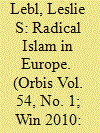

|
|
|
|
|
| Publication |
2010.
|
| Summary/Abstract |
Europe now faces three related but different challenges: how to respond, in a time when "native" European populations are shrinking, to the growing presence of Muslim minorities; how to avoid having its relationships with its Muslim communities controlled by Islamists who seek to replace Western civilization with Islamic government based on sharia law; and what to do generally about this Islamist threat. Thus far, the European responses to these challenges have been shaped by four factors: accumulated civilizational exhaustion; the inability to grasp the challenge posed to European national identities by the allure of the global Caliphate; weakness arising from degraded security capabilities, including the impact of the continued drive to "build Europe" by adopting the Treaty of Lisbon; and the preference for appeasement of Islamist demands.
|
|
|
|
|
|
|
|
|
|
|
|
|
|
|
|
| 8 |
ID:
093918


|
|
|
|
|
| Publication |
2010.
|
| Summary/Abstract |
Sovereignty is the bedrock of international law. If security requires that the United States transgress sovereign borders to attack foreign fighters and their support networks hiding in third countries, then the U.S. should adopt a strategy to amend international law accordingly. One should not be too quick, however, to disregard a robust notion of sovereignty, a concept that has helped avert conflict among the world's major powers. The United States needs a strategy for sovereignty's future that is based in the emerging security context and a prioritization of American interests. Instead, the United States and the rest of the world are meandering toward a less robust sovereignty with weaker and more ambiguous international law. The U.S. and its global interests would be better served by strong and clear international rules that increase predictability and that confer legitimacy to action against dangerous enemies.
|
|
|
|
|
|
|
|
|
|
|
|
|
|
|
|
| 9 |
ID:
093917


|
|
|
|
|
| Publication |
2010.
|
| Summary/Abstract |
Insurgencies that recruit foreign nationals to join rebel groups in various civil wars around the globe are a source of growing concern to policymakers. Despite attention focused on recent Islamist groups, foreign fighters are a phenomenon that is neither new nor uniquely Islamic. In conflicts from the Spanish Civil War to the Afghanistan War, insurgencies consistently recruited foreigners by framing the local war as one that threatened a shared transnational identity group and necessitated a defensive mobilization. It is therefore possible to draw lessons about combating their flow through counter-recruitment from a wide array of historical cases.
|
|
|
|
|
|
|
|
|
|
|
|
|
|
|
|